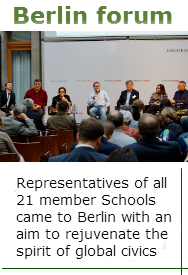Address by Ilgar Mammadov
Imprisoned Director of the Baku School of Political Studies
Within the time limits on the opportunity to communicate this letter I have no chance to check from prison the precise title of the formal mechanism which must exist at the PACE to deal with issues of ethics. In fact, I am addressing people in charge of that mechanism.
This address is a public one. Therefore, I feel obliged to begin it with an extensive acknowledgement gratitude to the CoE officials and institutions who in the past 3,5 years have been doing their best to release me – a political prisoner in a member country.
Following that I will discuss the less convincing, but still permissible overtures of the PACE with the ruling regime of Azerbaijan during the same period.
Finally, I will identify practices that I find unethical and therefore disappointing.
Chapter I. The ACKNOWLEGEMENTS OF GRATITUDE
Secretary General Tornbjorn Jagland’s calls made in the early days and months of my arrest (4 February 2013) had caused ire in the government . Fuad Alasgarov and Ali Hasanov, top legal and political affairs officials at the Presidential Administration, reflecting the personal mood of president Aliyev almost screamed in public that the courts arresting me and prolonging the detention have been impartial and fair and that it was none of Mr. Jagland’s business to meddle with this.
The regime’s language of those times was furious and tough – just do a thorough google search in Azerbaijani to recall. Mr. Aliyev needed that shouting tactics in order to give an impression that the authorities possessed a firm proof of my alleged guilt. Such an impression was of critical character for Aliyev before the 15 October 2013 presidential elections because I had been nominated to stand as a candidate and my participation could make important difference.
After the 15 April 2014 judgment of the ECtHR (published on 22 May and final since 13 October 2014) which had said: i) the real purpose of my arrest and prolonged detention had been to silence my criticism of the government ; ii) the courts had reviewed no potential evidence of my guilt while arresting and keeping me in prolonged detention; and iii) the law enforcement bodies had violated the presumption of my innocence, Mr. Jagland resumed his calls for my release – this time with reference to the facts established by the ECtHR.
The memory of their own very recent effrontery (Alasgarov’s and Hasanov’s authorised tactical shouting in particular) made the authorities look silly in the light of the ECtHR judgment. That is why they stopped hearing and reacting to Mr. Jagland.
In the meantime, criticism by the Secretary General was becoming lauder time after time – reinforced by the 4 decisions and 3 resolutions adopted by the CoE Committee of Ministers since 4 December 2014 and with growing insistence calling for my release as an act of execution of the ECtHE judgment.
By the way, on 11 August 2014 Mr. Jagland had a telephone conversation with Mr. Aliyev and they two agreed to re–establish the joint working group on human rights (which had dealt with imprisonment issues till 2005). As the group failed to produce significant progress, in November 2015 Secretary General ordered unilateral withdrawal of the CoE from the group, and in December 2015 he used his powers under Article 52 of the Convention for Protection of Human Rights and main Freedoms to make an official query into adherence of Azerbaijan to its CoE membership obligations.
The PACE first reacted to my arrest on 8 February 2013 at the level of rapporteurs of the Monitoring Committee Mr. Pedro Agramunt and Mr. Debono Grech (here and elsewhere spellings and titles may not be fully correct as I have no internet access to verify them). They expressed concern, may be about apparent political motivation – I can’t remember. In May 2013 they both visited me in prison.
Also in May 2013 PACE’s Human Rights Commissioner Nils Muznieks visited me. The authorities had been very reluctant to let him in the country. He was able to cross the border only due to a last minute interference by Azerbaijan’s former Ambassador to the CoE Mr. Arif Mammadov. (At that time he had been seconded by Baku to the Organization of Islamic Cooperation to represent the latter in Brussels. Now he is in opposition and self–exile in Europe).
On 21 May 2014, the rapporteurs Agramunt and Grech visited me again, this time taking even a two hours helicopter flight to the prison located in a remote town of Sheki.
PACE’s President Ann Brasseur tried to visit me in May 2014 during the PACE Permanent Committee meeting in Baku (23 May 2014), but only got a promise from Mr. Aliyev that she would be able to do so soon. Her remarks at the Permanent Committee session were very much of support spirit (see next chapter).
President Brasseur was finally permitted to visit me on 24 September 2014 – also upon a helicopter ride along beautiful view of the Caucasus mountains.
In November 2014 President Brasseur was very kind to react from Strasbourg to disbarring of my very trusted lawyer Khalid Bagirov for a short statement he had made at my trial. The disbarring was aimed at scaring other lawyers of mine, and undermining my confidence and security. Unfortunately, Madam President’s sincere effort has not resulted in re–admission of Mr. Bagirov to the bar association and he could not visit me since then.
In June 2015, the PACE adopted its only document in many years calling for release of political prisoners and naming me among 8 top priority prisoners. By the way, the other 7 had been arrested after the 15 April 2014 ECtHR judgment on my case and freed before 27 May 2016 – the deadline negotiated with the United States ahead of Mr. Aliyev’s 31 March 2016 visit to Washington D.C: Intentionally or not, the numerous arrests conducted after the ECtHR judgment had directed public attention from my case for time being.
On 1 March 2016, Mr. Agramunt, this time already President of the PACE, visited me again and even published a photo we took together in the end of our very substantive discussion.
On 1 April 2016, a group of experts of the CoE Committee for Prevention of Torture visited me in prison. This contributed to making my sense of security stronger after the orchestrated physical attacks of summer 2015 and the serious battery by the prison chief and guards on 16 October 2015. As far as I know, the CoE had interfered in October right after the incident – just like in May 2015 when it had helped to release me from solitary confinement where I had been placed for the second time since the arrest as part of the continuous pressure aiming to force me to undersign a plea for presidential pardon.
Chapter II. THE OVERTURES THAT DID NOT WORK
{The text of this Chapter is available only to the Secretary General Mr. Yagland. I leave this up to the discretion of Mr.Yagland to publish it or to establish the circle of people whose access to the text will be beneficial for the Council of Europe}
Chapter III. THE UNETHICAL PRACTICES
There is no need to describe in this appeal the whole range of difference I had with the new co-rapporteurs of the PACE Monitoring Committee at our meeting on 17 June 2016. Whereas Mr. Shennak was ready to discuss constructively and honestly the above skepticism, which I had managed to outline at the meeting, Mr. Caesar Florin Preda’s attitude was much in the spirit of Azerbaijani GoNGOs always trying to provide the authorities with the fresh excuse for personally my continued imprisonment.
Technically, that was all right, because people always have different opinions, and because I hold on to a tolerant view of social evils influencing politics – obviously within certain limits.
A week later I happened to read the official state newspapers reporting on the meetings the co-rapporteurs had conducted with the authorities on the previous day, that is 16 June 2016.
In particular, the report on their meeting with the chairman of Azerbaijani parliament quoted Mr. Florin Preda glorifying the Milli Majlis as “embodiment of democratic values”.
This new “glory” of Azerbaijan’s legislature by Mr. Florian Preda was still tolerable as I conceded that politics is not a bastion built of bricks of truth, but rather a tricky route to what truly matters in forming and backing such bricks. From this broader perspective I tolerated it even though the co-rapporteur’s assessment was in stark contrast with a number of OSCE/ODIHR election observation reports; with the annual US State Department reports, which say that the people of Azerbaijan is deprived of the right to change its government at free and fair elections; institutions operating in the fields of democracy and human rights – they call the Milli Majlis a rubber stump office at service of the President and appointed by the President.
To please the authorities even more, however, Mr. Florin Preda then went as far as speaking to them with delight about his and his family’s attendance of the 1st European Games in 2015 in Baku.
Let me remind you that on political level the democratic Europe boycotted the Games because the crackdown on democratic institutions in Azerbaijan was at its just another peak at the time. Only Mr.Erdogan and Mr.Putin were present at the opening ceremony and the former made even a sarcastic remark about absence of European leaders at the European Games.
The bombastic propaganda event called to demoralize political prisoners and overshadow the suffering of their families not only was happily attended by Mr.Florin Preda, now the co-rapporteur: today he emphasizes his family’s emotional connection to the scandalous celebration.
Given the impropriety of Mr. Florin Preda’s remarks, as quoted by the state-owned media in Azerbaijan, I hereby call on you, the PACE ethics body, to remove him, in cooperation with the Monitoring Committee, from the position of co-rapporteur on Azerbaijan.
Ilgar Mammadov,
Political prisoner
Azerbaijan








